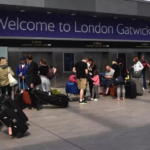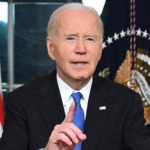
business forum, tech companies strike before reasonableness law vote
Amid a bitter, divisive national standoff over the Netanyahu government’s proposed radical overhaul of the judiciary, a leading business forum representing 150 of Israel’s largest companies announced a strike for Monday, which would see some banks, shopping centers, and petrol stations closed, and some businesses working under a reduced framework.
The coalition is preparing for the final Knesset vote on the “reasonableness” bill, which, if approved as-is on Monday or Tuesday, would prevent courts from applying the doctrine to evaluate the actions of politicians.
The forum, which is made up of the mall chain Big Shopping Centres, companies from the Azrieli Group, and banking institutions, asked other companies and organizations to “join the emergency step that we were forced to take” to stop the unilateral legislation and start talking about a compromise, according to a statement that Hebrew-language media reported on Sunday night.
Amid a bitter, divisive national standoff over the Netanyahu government’s proposed radical overhaul of the judiciary, a leading business forum representing 150 of Israel’s largest companies announced a strike for Monday, which would see some banks, shopping centers, and petrol stations closed, and some businesses working under a reduced framework.
The coalition is preparing for the final Knesset vote on the “reasonableness” bill, which, if approved as-is on Monday or Tuesday, would prevent courts from applying the doctrine to evaluate the actions of politicians.
The forum, which is made up of the mall chain Big Shopping Centres, companies from the Azrieli Group, and banking institutions, asked other businesses and organizations to “join the emergency step that we were forced to take” to stop the unilateral legislation and start talking about a compromise, according to a statement that Hebrew-language media reported on Sunday night.
Picture-in-PictureFullscreen
We must come to agreements that will stop the economy from suffering severe harm and the rift tearing society apart, disbanding the people’s army, and jeopardizing our collective security. The forum urges the prime minister to carry out his responsibilities, comprehend the potential scope of the catastrophe, and immediately halt the legislation so that negotiations can begin.
To put pressure on the government to halt the legislative push that has sparked hundreds of thousands of protests over several days and led to more than 10,000 military reservists preparing to halt their volunteer duty, more than 200 high-tech businesses, which have been at the forefront of anti-overhaul protests, and significant legal organizations also announced they would permit workers to strike on Monday.
According to Hebrew media, participating tech firms included Wix, Wiz, Papaya Global, and Lemonade. The announcements at midnight came hours after the Likud party, anti-government protesters, and some members of the opposition swiftly rejected a compromise proposal by the Histadrut, Israel’s largest labor federation, on the “reasonableness” bill.
Keep Reading
As it did in late March when the hardline coalition attempted to push several overhaul bills through the Knesset, the dismissal increased rumors that the influential labor union might declare a general strike. The legislation was swiftly put on hold by Prime Minister Benjamin Netanyahu to allow for talks with opposition party representatives hosted by President Isaac Herzog, which ended the one-day strike.
Herzog launched a last-ditch effort to find common ground on Sunday in an attempt to forge a consensus judicial reform package after those negotiations broke down.
Herzog, who had just returned from a trip to the US, hurried to schedule separate meetings with Netanyahu, who was still in the hospital after having a pacemaker implanted, and opposition leaders Yair Lapid and Benny Gantz as optimism grew that a breakthrough might be imminent.
Lapid appeared to support the president’s proposal, which is said to involve softening the “reasonableness” bill’s provisions and freezing further overhaul legislation to allow for substantive negotiations, but Gantz was rumored to be against it. A compromise with the government is fiercely opposed by protest organizers.
Regarding the proposals discussed at the meetings, there was no official statement. The opposition’s demand for an 18-month freeze on any new legislation while the sides try to reach an agreement, which the coalition sees as too long, was the main sticking point, according to Channel 12 news on Sunday evening. However, the opposition’s differences with the coalition on a potential softening of the “reasonableness” bill were not insurmountable.
Arnon Bar-David, the leader of the Histadrut, has come under intense pressure from opponents of the judicial reform to call a general strike to halt the coalition’s proposal to reduce court oversight of legislative actions. If no agreement could be reached by Sunday at 4 p.m., he had previously stated that a meeting would be called to discuss “further steps.”
The Histadrut had not chosen its course of action as of Sunday night at midnight. Leading companies planned to strike on Monday, but it wasn’t coordinated with the Histadrut.
Despite significant political and social opposition, increasing announcements by army reservists that they will not report for duty, as well as diplomatic, professional, social, economic, and security concerns raised by important Israeli officials and international allies, the coalition is expected to push legislation through on Monday or Tuesday to abolish the judicial yardstick of “reasonableness” for governmental and ministerial decisions.
The Histadrut draught proposal states that if a government decision relates to “matters of policy” and has the support of the entire cabinet, courts will not be able to overturn it because it is not “reasonable.” It was unclear whether a decision would pass the reasonableness test if it received the support of a majority of ministers, or if a unanimous vote of the entire cabinet would be necessary.
The use of the judicial standard to review the appointment of ministers and deputy ministers would also be prohibited for judges.
The proposal also called for the coalition and opposition to resume negotiations to come to an understanding “on the rest of the issues,” with the government agreeing to postpone any additional overhaul legislation for the next 18 months unless at least 75 Knesset members supported it. In the 120-seat parliament, 64 seats are held by Netanyahu’s administration.
Thousands of Israeli doctors from all over the country descended on Jerusalem on Sunday to protest the government’s legislative initiative.
Following a two-hour “warning strike” in the healthcare system on July 19, which was called by the Israel Medical Association, there was a march and rally on Sunday. Prof. Zion Hagay, chair of the IMA, declared that the IMA secretariat will start deliberating on whether to take such action as soon as Sunday evening, amid loud calls for a wider strike from many.
According to Hagay, the IMA has declared a labor dispute in the interim, positioning it to go on strike should it choose to do so. He added that the IMA would immediately file an appeal with the Supreme Court if the “reasonableness” bill were to pass.
Earlier on Sunday, thousands of reservists announced their intention to stop performing volunteer service in opposition to the government’s actions, prompting IDF Chief of Staff Lt. Gen. Herzi Halevi to issue a dire warning that the military’s unity was in “dangerously” jeopardy.
At the same time that Lapid met with Shin Bet director Ronen Bar to discuss the security situation and the rising tensions in the military, Halevi also had a rare meeting with Gantz, with Netanyahu’s approval.
Gantz stated following the meeting that the security situation is extremely concerning and demands attention and strategic choices on numerous fronts. He pledged that, sooner or later, we would repeal the reasonableness bill, even if it were to pass.
Following their meeting, Lapid told Bar that he had received a security overview of internal and external threats, and he emphasized his concern for national cohesion.
He asserted that maintaining national security and unity is our shared responsibility.









